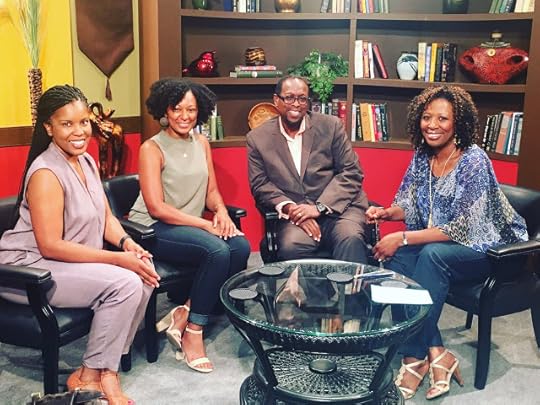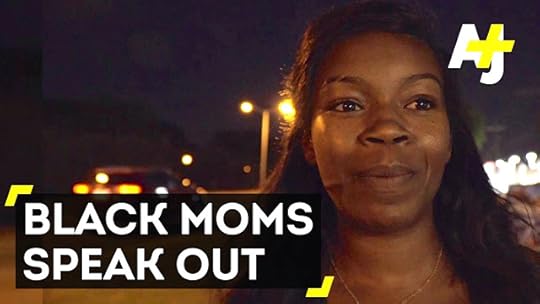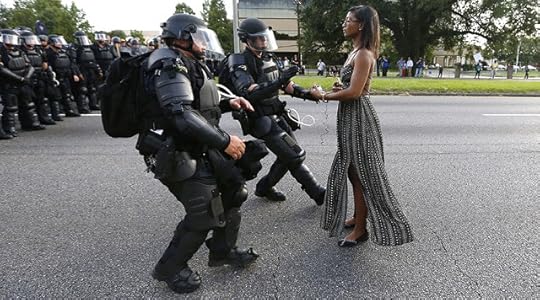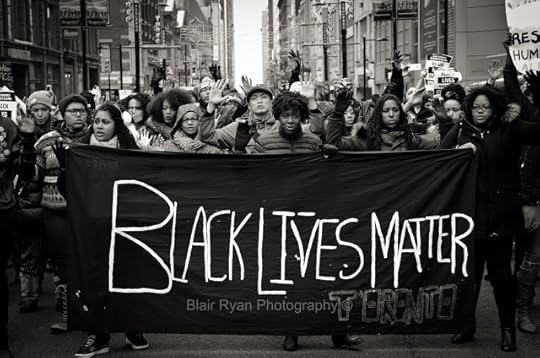Mark Anthony Neal's Blog, page 598
July 18, 2016
Samaria Rice Talks About Her Son Tamir + Anti-Black Police Violence + Politics
 'Samaria Rice talks with Fusion's Terrell Starr about her son Tamir Rice, police brutality, and politics.'
'Samaria Rice talks with Fusion's Terrell Starr about her son Tamir Rice, police brutality, and politics.'
Published on July 18, 2016 11:31
On Eve of GOP Convention Prophets of Rage Revisit Public Enemy's "Prophets of Rage”
 On the eve of the GOP Convention in Cleveland, OH, the supergroup Prophets of Rage -- Rage Against The Machine, Public Enemy and Cypress Hill -- drops a new studio recording, a cover of Public Enemy's "Prophets of Rage" from It Takes a Nation of Millions to Hold Us Back.
On the eve of the GOP Convention in Cleveland, OH, the supergroup Prophets of Rage -- Rage Against The Machine, Public Enemy and Cypress Hill -- drops a new studio recording, a cover of Public Enemy's "Prophets of Rage" from It Takes a Nation of Millions to Hold Us Back.
Published on July 18, 2016 11:11
July 17, 2016
Serena Williams + White Approval + Unapologetic Blackness by Lawrence Ware
 Serena Williams + The White Gaze + Unapologetic Blacknessby Lawrence Ware | @Law_Ware | NewBlackMan (in Exile)
Serena Williams + The White Gaze + Unapologetic Blacknessby Lawrence Ware | @Law_Ware | NewBlackMan (in Exile)There is a scene in Ryan Coogler’s Creed that makes my allergies act up. Tennis
In the central training montage, Adonis Creed, played by Michael B. Jordan, is running the streets of Philadelphia preparing for his fight with the Heavyweight Champion of the world. As he runs, the film converts the frame to slow motion as young black men from the neighborhood circle him riding ATVs and motorcycles. He’s met the guys earlier in the film, and they’d asked him why we was running. When he told them it was in preparation for a fight, they nodded approvingly.
This scene is so moving to me because it speaks to community. It speaks to the truth that I’ve experienced many times in my life. It reminds me that there are people from my community who believe in me; that support me. In that moment, as the bikes swirled around Creed, he was reminded that he was surrounded by a host of witnesses. They supported him. They would push him. They loved him. He was not fighting for only himself. He was fighting for them as well.
The Williams Sisters are the greatest American sports story of all time. They didn’t come from the right family. They did not attend the right schools. Born in Michigan, they moved to Compton, California, and practiced tennis by hitting balls out of shopping carts. Tennis is not a sport heavy on recruiting and developing new talent. They burst onto the tennis scene and forced the powers that be to come to terms with their athletic brilliance.
While Venus brilliantly paved the way, it is clear that Serena is arguably the greatest athlete this country has produced. On Saturday, Serena claimed her 22nd tennis Grand Slam title, tying Steffi Graf for the most in the Open Era. Yet, what separates her from Graf is that while the latter retired at the age of 30, Williams won 9 since living past her 360th month—and she is still going.
Serena is the embodiment of everything Americans like to think of themselves. She is a rag to riches story. She did things the right way. She never forgot where she came from. So why is she not more celebrated by all Americans? Usually when Americans enter the realm of international competition, we have a tendency to drape them in the flag. We do it every four years for the Summer Olympics. We do it again during the Winter Olympics. We even do it during the World Cup. Why is Serena not given this kind of national attention from white America? Why do the announcers call her games with so much sarcasm and barely-veiled disdain?
The answer is simple: she is unapologetically black.
One of the greatest sports moments I ever witnessed happened on Saturday, August 4, 2012. On that day, Serena Williams won the gold medal in women’s singles during the 2012 Olympic Games. To celebrate her victory, Williams sea walked on the grounds of Wimbledon.
It is display of blackness like these that keep white America from embracing Serena as one of their own. It is her association with Beyoncé. Her choice to wear the Puma cat suit and embrace her body without acquiescing to white norms of dress and conduct on the tennis court. Serena refuses to be what white America wants her to be. She doesn’t seek their approval, and she does not need it. She has a cloud of witnesses that cheer her on. She has a constituency that will never ask her to be anything other than who she is—who she was raised to be. We got you, Serena. We got us.
The same thing that brings me to tears in Creed is the same reason why I felt a welling of pride when I heard that Williams had won her 22nd Grand Slam. It was the understanding that this was not just about one person. This was about all of us. It was about the kids who are attending underfunded schools being inspired by her. It’s about them coming to the realization that hard work does, in fact, pay off. After the week we had, we needed that moment, however fleeting, of joy.
As Serena held up that trophy and smiled, I smiled too. Like the young black men in the film supporting Adonis Creed, I, too, was able to bear witness. She did it for herself, yes, but she did it for me too.
+++
Lawrence Ware is an Oklahoma State University Division of Institutional Diversity fellow. He teaches in OSU’s philosophy department and is the diversity coordinator for its Ethics Center. A frequent contributor to Counterpunch and Dissent magazine, he is also a contributing editor of NewBlackMan (in Exile) and the Democratic Left. He has been a commentator on race and politics for HuffPost Live, NPR’s Talk of the Nation and PRI’s Flashpoint. Follow him on Twitter.
Published on July 17, 2016 11:27
#DocsSoWhite: Sam Pollard + Roger Ross Williams + Sabrina Schmidt Gordon Talk Diversity
 'Is the documentary field more diverse than Hollywood? Directors Sam Pollard + Roger Ross Williams + Sabrina Schmidt Gordon + S. Leo Chiang address questions of representation and opportunity.' -- +Full Frame Documentary Film Festival
'Is the documentary field more diverse than Hollywood? Directors Sam Pollard + Roger Ross Williams + Sabrina Schmidt Gordon + S. Leo Chiang address questions of representation and opportunity.' -- +Full Frame Documentary Film Festival 2016 A&E IndieFilms Speakeasy: #DocsSoWhite from Full Frame Documentary Film Fest on Vimeo.
Published on July 17, 2016 07:24
July 16, 2016
Coffee + Broadband + Productivity + “Knocking the Hustle” by Mark Anthony Neal
 Coffee + Broadband + Productivity + “Knocking the Hustle”by Mark Anthony Neal | @NewBlackMan | NewBlackMan (in Exile)
Coffee + Broadband + Productivity + “Knocking the Hustle”by Mark Anthony Neal | @NewBlackMan | NewBlackMan (in Exile)Middle-of-the-afternoon, on an ungodly hot summer Friday in North Carolina, not too far from the so-called Research Triangle Park. Headed to one of my regular coffee haunts, knowing well in advance that I would likely walk in, scan the space, and retreat back out into the heat, because there was no place to work.
For more than twenty-years coffee shops have functioned as my mobile woodshed -- the places where I write, read, study, and increasingly do social media. There are many idiosyncratic reasons why the work of my my mind, favors such spaces (as opposed to my campus office or my home), much of which having to do with the idea of the moveable mess (that you can simply pack and unpack into a computer bag), my affinity for natural light (fluorescent lights are an affront to my very being) and the ability to be “alone in public,” a vestige of being an only child.
When I wrote my dissertation in the mid-1990s on an early generation Toshiba laptop, there was virtually no one working like me in those spaces; such activity was unique enough that I can remember the stares that the Negro Breakfast Club used to get at the Wolf Road Starbucks in Albany, NY -- the club included University of Texas Professor and playwright Lisa Thompson and author Debra Dickerson -- as we sat there talking shop and getting our work in.
Fast forward to 2016, and the very spaces where I might have been sitting with no more than five or six folk punching the keys on macs even five years ago, are now overrun, with folks literally sitting shoulder-to-shoulder, and waging low-key warfare for the tables closest to electrical outlets. Indeed, one of my spots, even posted a sign that one had to “buy” before they procured that prime space (and yes, I’m a habitual line-stepper.)
What gives?
The obvious change over the past decade has been the emergence of affordable broadband wi-fi, the quality of which at some coffee shops rivals that of elite universities and private corporations. If you live in a college town, you regularly witness the undergraduate and graduate students that colonize the local coffee shops, often to the dismay of shop owners, who will watch students buy a small cup of coffee and camp out for 10-hours, while bringing in food from somewhere else. Another one of my regular spots doesn’t have wi-fi for that very reason (and thank-God for mobile hotspots).
But the rather ordinary appearance of college students at your local coffee shop, obscures the fact that increasingly what one finds in such spaces are grown people, who are not just hanging out, but putting in real work, hustling, if you will. In his new book Knocking the Hustle: Against the Neoliberal Turn in Black Politics, political scientist Lester K. Spence, notes to the extent that hustling -- acts of “getting over” on people and systems two generations ago -- is now a prominent metaphor for thinking about productivity in contemporary America; “the hustler is now someone who consistently works.” (2)
The figure of the hustler and the act of hustling signals one of the paradoxes of this moment, which despite record levels of productivity by American workers, and record profits among corporations, inequality has increased (the redistribution of wealth from the poorest to the richest) and wages have, to use Spence’s term ‘flatlined.” As Spence writes, “Even as people are expected to be more and more productive, and...increasingly place more and more expectations upon themselves to be productive, the money they make as a result of that productivity flatlines, largely because of the way government ability to regulate business have been cut.” (13)
While this Neoliberal Turn, as Spence describes it, is also impacted by the degree to which technology and globalization have created contexts for higher profitability, it also highlights the role of “human capital” as an “individual trait.” This produces a belief, born out of the idea of the of the Hip-Hop Hustler -- the title of Spence’s book is inspired by Jay Z’s classic “Can’t Knock the Hustle” from his debut Reasonable Doubt -- where workers envision themselves as entrepreneurial spirits, or as Jay Z once famously opined “I not a businessman, I’m a business, man”
As witnessed on any given day, at any given coffee shop in America, there is this belief in the entrepreneurial dream -- middle managers, programmers, intellectual and legal professionals, and the like, believing they are working for themselves because of the relative control they have over their time, but without the equitable sharing of the profits generated by their labor -- as we work ourselves to death to the aroma of coffee and waffles and access to strong connectivity.
I now often find myself waking up at the crack of dawn, even on weekends, so that I am one the first people at my coffee shops of choice, zoning in on that prime outlet space and the promise of being productive.
+++
Mark Anthony Neal is the author of several books including Looking for Leroy: Illegible Black Masculinities (NYU Press, 2016). He is the host of the weekly video podcast Left of Black and curator of NewBlackMan (In Exile). Neal is Professor of African + African-American Studies and Professor of English at Duke University.
Published on July 16, 2016 07:54
July 15, 2016
What is Race? Thinking Through 21st Century Blackness
 'The concept of race is a complex matter, and often it is difficult to have a real conversation about race and ethnicity without tensions rising and offenses being launched. On this episode of Black Issues Forum Deborah Holt Noel has a dialogue about the definition of race and more with Dr. Candis Watts Smith of UNC-Chapel Hill, Dr. Mark Anthony Neal of Duke University, and Samone Oates-Bullock, a student at UNC-CH.' --
UNC-TV
'The concept of race is a complex matter, and often it is difficult to have a real conversation about race and ethnicity without tensions rising and offenses being launched. On this episode of Black Issues Forum Deborah Holt Noel has a dialogue about the definition of race and more with Dr. Candis Watts Smith of UNC-Chapel Hill, Dr. Mark Anthony Neal of Duke University, and Samone Oates-Bullock, a student at UNC-CH.' --
UNC-TV
Published on July 15, 2016 18:32
Police Violence: Black Mothers Speak Out
 'Black mothers speak out at a protest in Baton Rouge, Louisiana, after the police shooting deaths of Alton Sterling and Philando Castile.' -- +AJ+
'Black mothers speak out at a protest in Baton Rouge, Louisiana, after the police shooting deaths of Alton Sterling and Philando Castile.' -- +AJ+
Published on July 15, 2016 18:16
How The Neoliberal Arm Wields Police Violence in Cities Across America
 'Jordan T. Camp and Christina Heatherton explore the hidden economic dimension behind police brutality and mass incarceration in the United States -- the neoliberal forces expanding criminalization and state violence in service of privatization and gentrification -- and explain why a solution to the carceral state is not more training or more cameras, but less contact with the police in the lives of Americans. Camp and Heatherton edited the collection Policing the Planet: Why the Policing Crisis Led to Black Lives Matter (Verso Books).'
'Jordan T. Camp and Christina Heatherton explore the hidden economic dimension behind police brutality and mass incarceration in the United States -- the neoliberal forces expanding criminalization and state violence in service of privatization and gentrification -- and explain why a solution to the carceral state is not more training or more cameras, but less contact with the police in the lives of Americans. Camp and Heatherton edited the collection Policing the Planet: Why the Policing Crisis Led to Black Lives Matter (Verso Books).'
Published on July 15, 2016 18:00
Strange Fruit: Reflections On Three Summers Of Black Lives Matter
 '
Strange Fruit -- The Podcast
, looks back on three summers of #BlackLivesMatter activism and they talk about Yale employee Corey Menafee, who pulled a Bree Newsome in the Calhoun College dining hall, where he worked and smashed a stained glass window that depicted enslaved people picking cotton. Menafee was arrested and charged with a misdemeanor for reckless endangerment in the second degree and a felony for criminal mischief in the first degree. Yale has asked the state's attorney in Connecticut to drop the charges, and Menafee has since resigned.'
'
Strange Fruit -- The Podcast
, looks back on three summers of #BlackLivesMatter activism and they talk about Yale employee Corey Menafee, who pulled a Bree Newsome in the Calhoun College dining hall, where he worked and smashed a stained glass window that depicted enslaved people picking cotton. Menafee was arrested and charged with a misdemeanor for reckless endangerment in the second degree and a felony for criminal mischief in the first degree. Yale has asked the state's attorney in Connecticut to drop the charges, and Menafee has since resigned.'
Published on July 15, 2016 17:52
Looking At The World Through Rhyme: Meet Rapsody
 'Growing up in the small town of Snow Hill, N.C., Marlanna Evans, a.k.a Rapsody, wasn't exposed to much hip-hop music. While attending North Carolina State University, Evans helped hip-hop culture grow on campus with a student music group that would meet in a dormitory lounge to rap battle. Currently signed to Jamla Records, founded by 9th Wonder, Rapsody's solo work includes collaborations with Talib Kweli, Common and Kendrick Lamar. Host Frank Stasio talks with Evans about growing up in a rural community, cultivating Raleigh's rap scene and looking at the world through rhymes.'--
WUNC's The State of Things
'Growing up in the small town of Snow Hill, N.C., Marlanna Evans, a.k.a Rapsody, wasn't exposed to much hip-hop music. While attending North Carolina State University, Evans helped hip-hop culture grow on campus with a student music group that would meet in a dormitory lounge to rap battle. Currently signed to Jamla Records, founded by 9th Wonder, Rapsody's solo work includes collaborations with Talib Kweli, Common and Kendrick Lamar. Host Frank Stasio talks with Evans about growing up in a rural community, cultivating Raleigh's rap scene and looking at the world through rhymes.'--
WUNC's The State of Things
Published on July 15, 2016 17:42
Mark Anthony Neal's Blog
- Mark Anthony Neal's profile
- 30 followers
Mark Anthony Neal isn't a Goodreads Author
(yet),
but they
do have a blog,
so here are some recent posts imported from
their feed.



